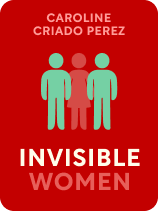

This article is an excerpt from the Shortform book guide to "Invisible Women" by Caroline Criado Perez. Shortform has the world's best summaries and analyses of books you should be reading.
Like this article? Sign up for a free trial here .
What are the most memorable Invisible Women quotes? What are the most noteworthy passages worth revisiting?
In Invisible Women, feminist campaigner Caroline Criado Perez argues that most humans operate under a male-as-default mindset, which causes a gender data gap. When there is no data about women, people (especially men) assume that the experience of the average man represents the experience of the average woman.
Below is a selection of quotes from Invisible Women with explanations.
Invisible Women Quotes
Perez says that our male-as-default mindset leads us to create cars and medicines that put women’s health at risk. This mindset also results in and stems from a gender data gap that harms women’s economic standing. Finally, Perez explains how our lack of consideration for gender-specific concerns harms women’s safety everywhere from trains to refugee camps—and ultimately reinforces the male-as-default mindset.
The following Invisible Women quotes highlight Perez’s key ideas that support her argument.
“There is no such thing as a woman who doesn’t work. There is only a woman who isn’t paid for her work.”
Perez specifically contends that due to our male-as-default mindset, we collect data on people and assume that it represents the average life experience. However, women have gender-specific concerns—and by not collecting and using sex-disaggregated data (data that is separated by sex) we create systems that ultimately discriminate against women.
To illustrate how this happens, Perez points to how modern governments that don’t gender-analyze their budgets spend and save money. These governments often try to foster economic growth by cutting taxes on their highest earners. However, almost every country has a gender pay gap: Globally, men earn nearly 38% more than women. Since high earners are more likely to be men, these tax cuts are more likely to benefit men—not women. Therefore Perez argues that by not gender-analyzing their taxation systems, modern governments pass tax policies that disproportionately benefit men and thus discriminate against women.
“For millennia, medicine has functioned on the assumption that male bodies can represent humanity as a whole. As a result, we have a huge historical data gap when it comes to female bodies, and this is a data gap that is continuing to grow as researchers carry on ignoring the pressing ethical need to include female cells, animals and humans, in their research.”
Perez explains that many pharmaceutical companies operate on a male-as-default mindset: They test their drugs exclusively on men and assume they’ll also work on women. Why not include women? Women’s hormones fluctuate throughout their menstrual cycle—and these companies worry that introducing this additional variable would make their test results less clear.
However, Perez argues, this decision to not test drugs on women ultimately harms women’s health. Men and women are biologically different, so these drugs affect them differently: For example, women tend to metabolize drugs faster than men. So by giving women drugs that haven’t been tested on women, these companies are not supporting women’s health at best and actively harming it at worst. As evidence, Perez points to the fact that women are far more likely to experience an adverse drug reaction than men are. One of the most common is that the drug fails to treat the condition it’s supposed to.
“When planners fail to account for gender, public spaces become male spaces by default.”
Perez argues that thanks to the gender data gap, many products work for the average man but not the average woman. The same is true of systems. Notably, many public transit systems don’t adequately protect women: Several statistics indicate that these systems aren’t equally safe for men and women because women are far more likely to be sexually harassed on public transit than men are.
But why don’t public transit systems adequately protect women? Perez believes this is because of a gender data gap that reinforces the male-as-default mindset: Women who are sexually harassed on public transit don’t report the crime.
In this way, Perez contends public transit systems’ failures to provide adequate reporting procedures results in a gender data gap: Public transit agencies don’t have data indicating that women are less safe on public transit than men are—in fact, official statistics suggest that men are more likely to be victimized in public. Moreover, the people who run these agencies are usually men, so they believe these statistics: They’ve likely never been harassed on public transit, so they don’t have the life experience that suggests these statistics might be wrong. This lack of knowledge is also a manifestation of a gender data gap.

———End of Preview———
Like what you just read? Read the rest of the world's best book summary and analysis of Caroline Criado Perez's "Invisible Women" at Shortform .
Here's what you'll find in our full Invisible Women summary :
- How society's male-as-default mindset leads to a gender data gap
- Why cars don't properly protect women during accidents
- Why we don’t know how most medicines affect women






